-
 Bitcoin
Bitcoin $114400
0.68% -
 Ethereum
Ethereum $3550
2.48% -
 XRP
XRP $3.001
4.99% -
 Tether USDt
Tether USDt $0.9999
0.01% -
 BNB
BNB $757.6
1.46% -
 Solana
Solana $162.9
1.07% -
 USDC
USDC $0.9998
0.00% -
 TRON
TRON $0.3294
0.91% -
 Dogecoin
Dogecoin $0.2015
2.46% -
 Cardano
Cardano $0.7379
2.01% -
 Stellar
Stellar $0.4141
8.83% -
 Hyperliquid
Hyperliquid $37.83
-1.91% -
 Sui
Sui $3.454
0.76% -
 Chainlink
Chainlink $16.62
3.53% -
 Bitcoin Cash
Bitcoin Cash $554.6
2.84% -
 Hedera
Hedera $0.2486
3.91% -
 Ethena USDe
Ethena USDe $1.001
0.00% -
 Avalanche
Avalanche $21.95
3.34% -
 Toncoin
Toncoin $3.563
-2.85% -
 Litecoin
Litecoin $112.7
2.65% -
 UNUS SED LEO
UNUS SED LEO $8.977
0.13% -
 Shiba Inu
Shiba Inu $0.00001232
1.85% -
 Uniswap
Uniswap $9.319
2.93% -
 Polkadot
Polkadot $3.632
1.38% -
 Monero
Monero $307.2
2.36% -
 Dai
Dai $0.9997
-0.03% -
 Bitget Token
Bitget Token $4.340
0.91% -
 Pepe
Pepe $0.00001048
1.07% -
 Cronos
Cronos $0.1348
3.26% -
 Aave
Aave $261.5
1.93%
What are the cases of charitable and public welfare uses of NFTs?
NFTs offer charities innovative fundraising methods, including direct donations, campaigns, fractional ownership, and community building; however, challenges like regulatory uncertainty and market volatility require careful planning and transparency for success.
Mar 03, 2025 at 12:12 am
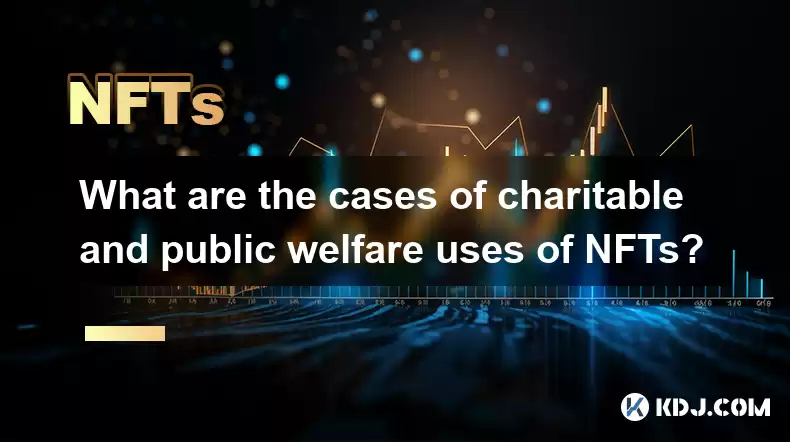
What are the Cases of Charitable and Public Welfare Uses of NFTs?
Key Points:
- NFTs' unique properties, such as verifiable scarcity and provenance, offer novel opportunities for charitable giving and public welfare initiatives.
- Direct donations, fundraising campaigns, fractionalized ownership, and community building are prominent use cases.
- Challenges include regulatory uncertainty, technological limitations, and the need for increased user education and accessibility.
- Successful implementations require careful planning, transparency, and community engagement.
- The future of NFT philanthropy hinges on addressing these challenges and leveraging emerging technologies to maximize impact.
Cases of Charitable and Public Welfare Uses of NFTs:
- Direct Donations of NFTs: Non-fungible tokens (NFTs) can be directly donated to charities as a form of fundraising. This approach leverages the growing popularity and value of NFTs within the crypto community. For instance, an artist could donate a unique piece of digital art as an NFT to a charity auction. The charity then either sells the NFT directly, generating funds, or holds onto it as a valuable asset to be sold at a later date or used for future fundraising initiatives. The transparent nature of the blockchain ensures the donation's authenticity and verifiability, providing donors with a sense of security and confidence in their contribution. The value of the NFT can fluctuate, introducing an element of risk, but this risk can be mitigated by choosing established, reputable projects and conducting thorough due diligence. Moreover, the donation itself can be used as a marketing tool for the charity, attracting attention from new donors and raising awareness about its cause. The novelty of donating NFTs might also appeal to younger demographics more accustomed to digital assets and online interactions, widening the charity's donor base. However, challenges remain. The volatility of the NFT market can impact the actual value received by the charity, and the technical knowledge required to receive and manage NFTs might be a barrier for some organizations. The lack of standardized processes for receiving and managing NFT donations also requires charities to adapt their existing infrastructure and develop new internal procedures. Finally, ensuring the security of the donated NFTs and preventing potential fraud requires careful consideration and robust security measures.
- NFT Fundraising Campaigns: Charities can launch dedicated fundraising campaigns centered around NFTs. These campaigns often involve creating and selling a limited collection of NFTs directly related to the charity's mission or cause. For example, an environmental charity might create a collection of NFTs depicting endangered species, with proceeds going directly towards conservation efforts. The limited supply of NFTs and the unique digital ownership they provide can incentivize purchases, potentially attracting both crypto enthusiasts and those unfamiliar with NFTs but supportive of the charity's work. A successful campaign requires careful planning, including the creation of compelling NFT artwork, a well-defined marketing strategy, and a transparent process for handling donations. The use of smart contracts can automate the donation process, enhancing efficiency and trust. The campaign's success also depends on the ability to reach the target audience and communicate effectively the value proposition of the NFTs and the impact of the donations. Choosing the right platform for selling the NFTs is also crucial, considering factors such as transaction fees, audience reach, and ease of use. Challenges include potential scalability issues if the campaign receives unexpectedly high demand, as well as the need to manage the expectations of donors regarding the long-term value of the NFTs. Furthermore, ensuring compliance with relevant regulations and tax laws related to NFT sales is vital for maintaining the integrity and legality of the campaign.
- Fractionalized Ownership of Assets through NFTs: High-value assets, like rare artwork or real estate, can be fractionalized into NFTs, allowing multiple individuals to collectively own a share. This enables charities to receive donations in the form of fractional ownership of these assets, offering a unique and potentially lucrative fundraising opportunity. For instance, a museum might fractionalize a valuable painting into NFTs, selling these fractions to raise funds for preservation or educational programs. This approach allows for broader participation in philanthropy, as smaller donations can collectively contribute to the acquisition or preservation of significant assets. The fractional ownership model introduces several complexities, however. The legal framework surrounding fractional ownership needs to be carefully considered to ensure compliance and protect the rights of all stakeholders. The management of the underlying asset and the distribution of any potential returns also require clear and transparent governance structures. The technical implementation of fractional ownership through NFTs also presents challenges, particularly in ensuring accurate tracking of ownership and seamless transfer of fractions. Moreover, the fluctuating value of the underlying asset and the potential for disputes among fractional owners necessitate robust mechanisms for dispute resolution. The marketing and communication surrounding the fractional ownership model are crucial for attracting potential donors and building trust in the process. Transparency and clear communication about the risks and rewards associated with fractional ownership are essential for ensuring a successful campaign.
- Community Building and Engagement: NFTs can be used to foster a sense of community and engagement among donors and supporters of a charity. For example, a charity might offer exclusive NFTs to donors who contribute above a certain threshold, granting them access to special events, merchandise, or voting rights within the organization. This approach leverages the social and collectibility aspects of NFTs to create a stronger connection between the charity and its supporters. It can also incentivize larger donations and cultivate a more loyal donor base. Building a strong community around the NFT initiative requires careful planning and engagement. Creating a vibrant online community where donors can interact with each other and the charity is crucial for fostering a sense of belonging and shared purpose. The use of social media and other online platforms can facilitate community building. However, effective community management is essential to ensure a positive and productive environment. Addressing concerns and feedback from the community is also crucial for maintaining trust and transparency. Furthermore, balancing the needs of the community with the operational needs of the charity requires careful consideration. The long-term sustainability of the community and its engagement with the charity needs to be strategically planned. Finally, it is important to recognize that not all charities will benefit from an NFT-based community approach, and a careful assessment of the charity’s goals and audience is essential before implementing such a strategy.
FAQs:
Q: What are the legal and regulatory implications of using NFTs for charitable purposes?
A: The legal and regulatory landscape surrounding NFTs is still evolving. Charities need to ensure compliance with relevant laws concerning fundraising, tax regulations, and securities laws, depending on the specific use case and jurisdiction. Legal counsel specializing in blockchain and NFT technology is recommended to navigate this complex area.
Q: How can charities ensure the security of NFTs used for fundraising?
A: Charities should utilize secure wallets and platforms for managing NFTs. Implementing robust security measures, such as multi-signature wallets and two-factor authentication, is crucial. Regular security audits and updates are also necessary to mitigate potential risks.
Q: What are the ethical considerations involved in using NFTs for charitable purposes?
A: Transparency and accountability are paramount. Charities need to clearly communicate how NFT proceeds will be used and provide regular updates on their impact. Avoiding misleading marketing practices and ensuring fair pricing are also vital ethical considerations.
Q: What are the potential downsides of using NFTs for charity?
A: The volatility of the NFT market poses a risk to the value of NFT donations. Technological limitations and the need for user education can hinder adoption. Scalability issues and high transaction fees can also pose challenges.
Q: How can charities effectively promote their NFT fundraising campaigns?
A: A multi-faceted approach is needed, combining social media marketing, collaborations with influencers, and partnerships with NFT marketplaces. Clearly articulating the charity's mission and the impact of donations is crucial. Building a strong online community around the campaign can also enhance its success.
Disclaimer:info@kdj.com
The information provided is not trading advice. kdj.com does not assume any responsibility for any investments made based on the information provided in this article. Cryptocurrencies are highly volatile and it is highly recommended that you invest with caution after thorough research!
If you believe that the content used on this website infringes your copyright, please contact us immediately (info@kdj.com) and we will delete it promptly.
- Cryptocurrency, Altcoins, and Profit Potential: Navigating the Wild West
- 2025-08-04 14:50:11
- Blue Gold & Crypto: Investing Disruption in Precious Metals
- 2025-08-04 14:30:11
- Japan, Metaplanet, and Bitcoin Acquisition: A New Era of Corporate Treasury?
- 2025-08-04 14:30:11
- Coinbase's Buy Rating & Bitcoin's Bold Future: A Canaccord Genuity Perspective
- 2025-08-04 14:50:11
- Coinbase's Buy Rating Maintained by Rosenblatt Securities: A Deep Dive
- 2025-08-04 14:55:11
- Cryptos, Strategic Choices, High Returns: Navigating the Meme Coin Mania
- 2025-08-04 14:55:11
Related knowledge
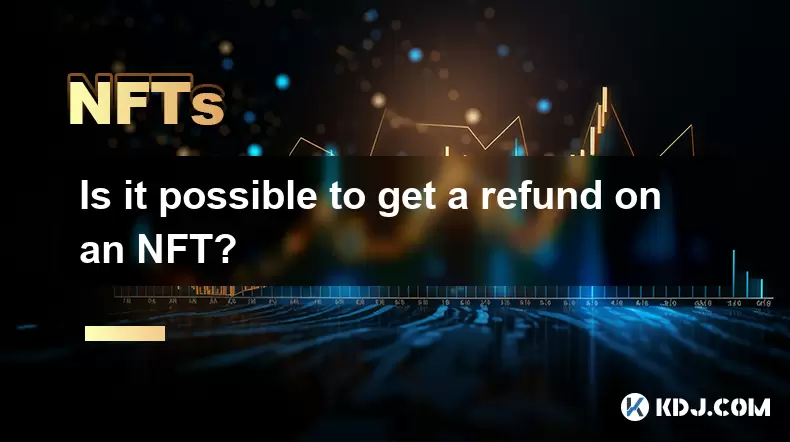
Is it possible to get a refund on an NFT?
Jul 21,2025 at 08:35pm
Understanding NFT Transactions and RefundsWhen you purchase an NFT (Non-Fungible Token), the transaction is typically recorded on a blockchain, making...
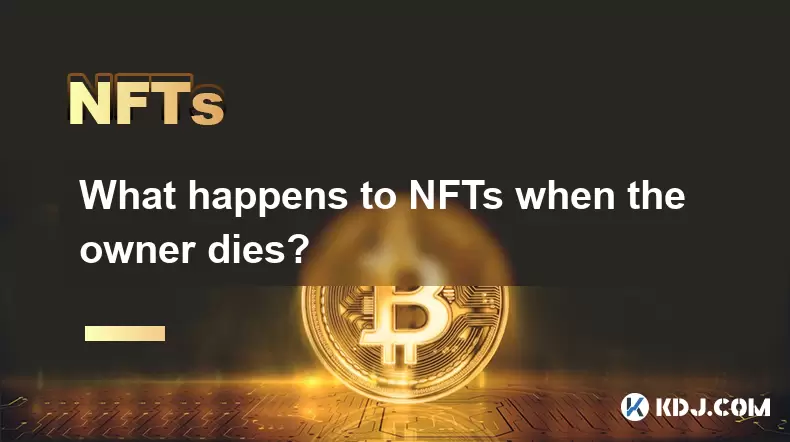
What happens to NFTs when the owner dies?
Jul 22,2025 at 02:43pm
Legal Ownership and Digital AssetsWhen an individual owns NFTs, the question of what happens to these assets upon their death is a pressing one. NFTs ...
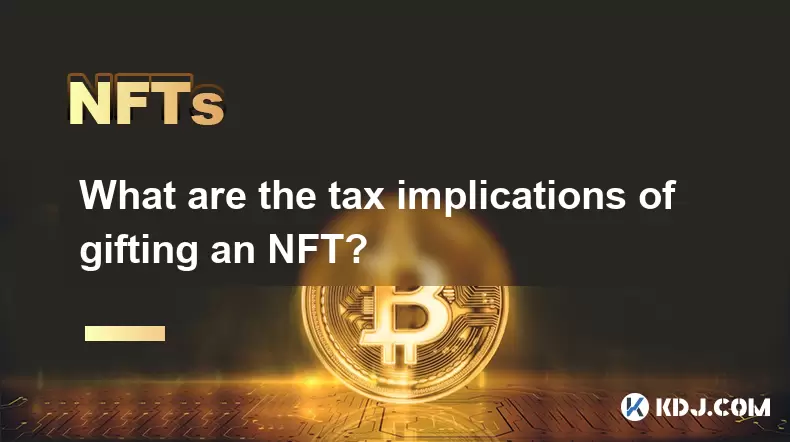
What are the tax implications of gifting an NFT?
Jul 19,2025 at 04:21am
Understanding the Basics of NFT GiftingGifting a Non-Fungible Token (NFT) involves transferring ownership from one individual to another without recei...
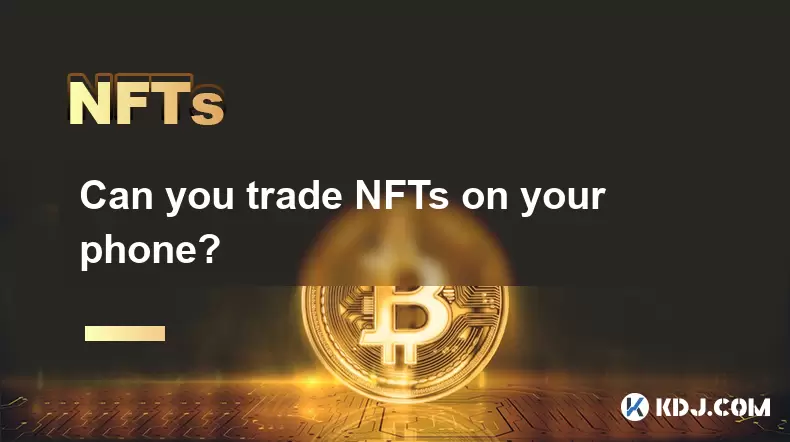
Can you trade NFTs on your phone?
Jul 18,2025 at 04:29am
Trading NFTs on Mobile DevicesYes, you can trade NFTs on your phone, and the process has become increasingly streamlined thanks to a variety of mobile...
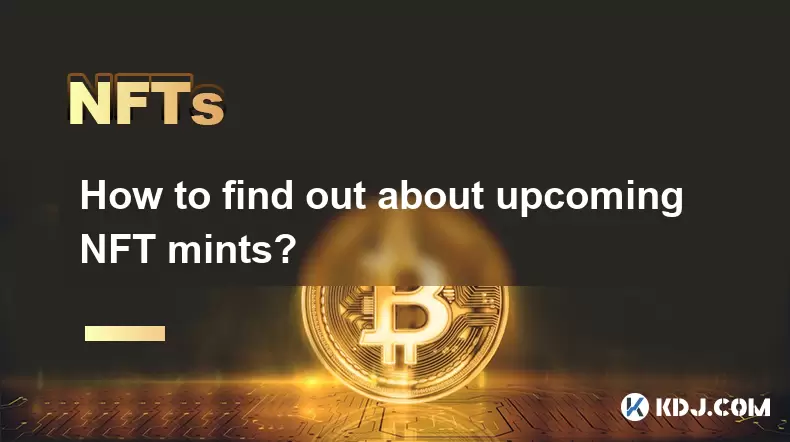
How to find out about upcoming NFT mints?
Jul 18,2025 at 11:50am
Exploring NFT Minting OpportunitiesUnderstanding the landscape of upcoming NFT mints is crucial for collectors, investors, and creators who wish to st...
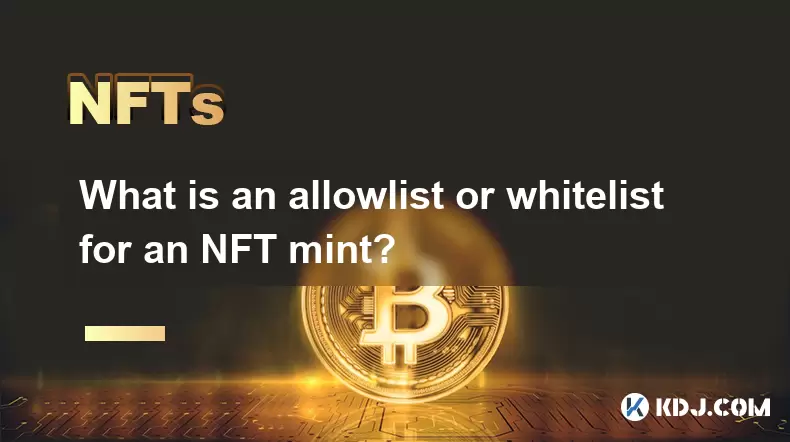
What is an allowlist or whitelist for an NFT mint?
Jul 20,2025 at 07:14pm
Understanding the Concept of an Allowlist for NFT MintingAn allowlist, also commonly referred to as a whitelist, is a mechanism used in the NFT mintin...

Is it possible to get a refund on an NFT?
Jul 21,2025 at 08:35pm
Understanding NFT Transactions and RefundsWhen you purchase an NFT (Non-Fungible Token), the transaction is typically recorded on a blockchain, making...

What happens to NFTs when the owner dies?
Jul 22,2025 at 02:43pm
Legal Ownership and Digital AssetsWhen an individual owns NFTs, the question of what happens to these assets upon their death is a pressing one. NFTs ...

What are the tax implications of gifting an NFT?
Jul 19,2025 at 04:21am
Understanding the Basics of NFT GiftingGifting a Non-Fungible Token (NFT) involves transferring ownership from one individual to another without recei...

Can you trade NFTs on your phone?
Jul 18,2025 at 04:29am
Trading NFTs on Mobile DevicesYes, you can trade NFTs on your phone, and the process has become increasingly streamlined thanks to a variety of mobile...

How to find out about upcoming NFT mints?
Jul 18,2025 at 11:50am
Exploring NFT Minting OpportunitiesUnderstanding the landscape of upcoming NFT mints is crucial for collectors, investors, and creators who wish to st...

What is an allowlist or whitelist for an NFT mint?
Jul 20,2025 at 07:14pm
Understanding the Concept of an Allowlist for NFT MintingAn allowlist, also commonly referred to as a whitelist, is a mechanism used in the NFT mintin...
See all articles

























































































